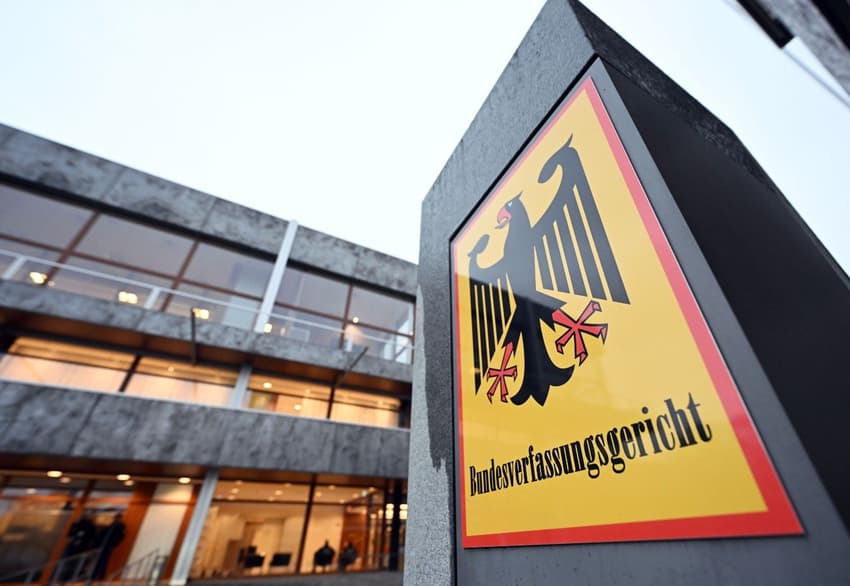Court turns down AfD-led challenge to Germany's spending in pandemic

The German Constitutional Court rejected challenges Tuesday to Berlin's participation in the European Union's coronavirus recovery fund, but expressed some reservations about the massive package.
Germany last year ratified the €750-billion ($790-billion) fund, which offers loans and grants to EU countries hit hardest by the pandemic.
The court in Karlsruhe ruled on two challenges, one submitted by a former founder of the far-right AfD party, and the other by a businessman.
They argued the fund could ultimately lead to Germany, Europe's biggest economy, having to take on the debts of other EU member states on a permanent basis.
But the Constitutional Court judges ruled the EU measure does not violate Germany's Basic Law, which forbids the government from sharing other countries' debts.
READ ALSO: Germany plans return to debt-limit rules in 2023
The judgement noted the government had stressed that the plan was "intended to be a one-time instrument in reaction to an unprecedented crisis".
It also noted that the German parliament retains "sufficient influence in the decision-making process as to how the funds provided will be used".
The judges, who ruled six to one against the challenges, did however express some reservations.
They questioned whether paying out such a large amount over the planned period - until 2026 - could really be considered "an exceptional measure" to fight the pandemic.
At least 37 percent of the funds are aimed at achieving climate targets, the judges said, noting it was hard to see a link between combating global warming and the pandemic.
READ ALSO: Germany to fast-track disputed €200 billion energy fund
They also warned against any permanent mechanism that could lead to EU members taking on joint liability over the long term.
Berenberg Bank economist Holger Schmieding said the ruling had "raised serious doubts whether the joint issuance to finance the fund is in line with" EU treaties.
"The German court -- once again -- emphasised German limits for EU fiscal integration," he said.
The court had already thrown out a legal challenge, in April 2021, that had initially stopped Berlin from ratifying the financial package.
Along with French President Emmanuel Macron, then chancellor Angela Merkel sketched out the fund in 2020, which eventually was agreed by the EU's 27 members in December.
The first funds were disbursed in summer 2021, with the most given to Italy and Spain, both hit hard by the pandemic.
Comments
See Also
Germany last year ratified the €750-billion ($790-billion) fund, which offers loans and grants to EU countries hit hardest by the pandemic.
The court in Karlsruhe ruled on two challenges, one submitted by a former founder of the far-right AfD party, and the other by a businessman.
They argued the fund could ultimately lead to Germany, Europe's biggest economy, having to take on the debts of other EU member states on a permanent basis.
But the Constitutional Court judges ruled the EU measure does not violate Germany's Basic Law, which forbids the government from sharing other countries' debts.
READ ALSO: Germany plans return to debt-limit rules in 2023
The judgement noted the government had stressed that the plan was "intended to be a one-time instrument in reaction to an unprecedented crisis".
It also noted that the German parliament retains "sufficient influence in the decision-making process as to how the funds provided will be used".
The judges, who ruled six to one against the challenges, did however express some reservations.
They questioned whether paying out such a large amount over the planned period - until 2026 - could really be considered "an exceptional measure" to fight the pandemic.
At least 37 percent of the funds are aimed at achieving climate targets, the judges said, noting it was hard to see a link between combating global warming and the pandemic.
READ ALSO: Germany to fast-track disputed €200 billion energy fund
They also warned against any permanent mechanism that could lead to EU members taking on joint liability over the long term.
Berenberg Bank economist Holger Schmieding said the ruling had "raised serious doubts whether the joint issuance to finance the fund is in line with" EU treaties.
"The German court -- once again -- emphasised German limits for EU fiscal integration," he said.
The court had already thrown out a legal challenge, in April 2021, that had initially stopped Berlin from ratifying the financial package.
Along with French President Emmanuel Macron, then chancellor Angela Merkel sketched out the fund in 2020, which eventually was agreed by the EU's 27 members in December.
The first funds were disbursed in summer 2021, with the most given to Italy and Spain, both hit hard by the pandemic.
Join the conversation in our comments section below. Share your own views and experience and if you have a question or suggestion for our journalists then email us at [email protected].
Please keep comments civil, constructive and on topic – and make sure to read our terms of use before getting involved.
Please log in here to leave a comment.